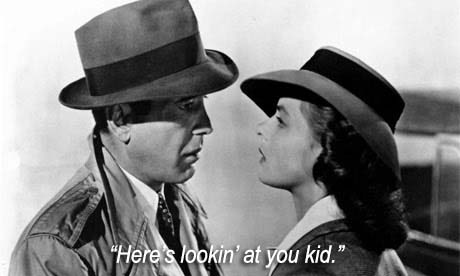Getting Clients to Sign on the Dotted Line
So, how do you feel about working for free?
I bet your prospects really love you. You dote on them with the zeal of an Ottoman prince, buying breakfast and their bi-hourly Starbucks (always extra sweet and happily biting the $.49 upcharge for soy milk), showering them with a lifetime supply of click pens and Post-it notes, showing off your mad back massage skills, offering your chauffeur services to go scout out that hot property on the eastern edge of Mordor. Gas? Pffffh…please. It’s all in a day’s work. You remember their children better than they do — once you even picked up that brat Damian from the principal’s office after he tried to stick a crayon through his classmate’s ear. Oh, and let’s not forget the time you kidnapped your mother to make Thanksgiving dinner for them. The turkey you even strangled yourself.
And then you go back to home to your makeshift apartment in your parents’ attic, and heat up a bowl of Ramen on your hotplate as you watch the squirrels chuck acorns at your painted-shut window and wonder exactly where in your life did it all go wrong. It seemed to be going so well, didn’t it? You did everything your clients ever dreamed of and then some — for weeks — only for them to “go in a different direction” and leave you feeling like Humphrey Bogart in Casablanca, heart dangling in the wind with nothing but a fedora, a wise-cracking piano player, and some stiff scotch to keep you company.

Working for free will make you a lot of fair-weather friends. But working for free while trying to run a business and carve out a modest middle-class life for yourself? Good luck with that. So if trying to make a profit while working for free sounds like something approaching Lovecraftian-level insanity, why do so many agents happily insist on doing exactly that? Being an agent means operating counter to some long-established, core human instincts: chiefly the fear of rejection. Now, there’s a very small percentage of the population not born or bothered by this particular gene (Donald Trump anyone?). I’m not one of them, and I’m pretty sure the vast majority of agents aren’t either.
So what happens when we give in to these fears in the real estate business? Well, you end up being inducted into the holy pantheon of manservants among the likes of Lurch and Alfred Pennyworth — only with the financial income of a Salvation Army bellringer. We need to rectify this.

And there’s one glorious, magnificent piece of paper that solves all our problems: the seller’s agreement. We get our clients to sign this, guaranteeing ourselves a place at the closing table, and we can invest in a proper BB gun to take care of our squirrel infestation. Regardless of what your instincts may tell you, there’s no reason to fear this wondrous document. It’s your ticket onto the gravy train; we just lack the confidence to emphasize it for fear of making our clients run for the hills. And, honestly, that’s understandable. Just like rejection, people also fear commitment. Whenever a client senses that they’re being tied down in one form or another, his or her first instinct is to cry uncle until a good Samaritan comes by to cut them loose. But tie them down we must. Thus is the ancient, ritualistic Dance of Real Estate Agent.
So how do we begin?
First off, we need to change your outlook on what emphasizing signing the seller’s agreement actually means. Nobody likes pushing people, right? We don’t want to be that guy who solicits our prospects constantly until the police arrive at our doorstep. It’s unbecoming; it’s unprofessional. Most importantly, it makes it looks like we need them more than they need us.
Instead, think about the agreement in terms of brand positioning. How precious is your time to you? Don’t look at yourself as just one of thousands, desperately trying to land a fish before someone else gets to it. No, you’re too good for such petty competitions. You’re above that nonsense. You’re not just an agent working in the region — you’re the agent in the region. You’re the Nike Shoes of real estate, the iPhone, Rolex, Tesla, Campbell’s Soup. You’re hot stuff — a priceless commodity. You don’t have to go out door knocking to find business because the business comes to you. Therefore, when you decide to set foot off Mount Olympus, obviously your time is worth something — and you don’t just give it away to anyone for free, right? Of course not!
Note: I don’t care if you get up at the crack of dawn to knock on doors or not. That’s a great strategy, honestly. How you collect your leads is entirely up to you. What I’m talking about is your branding image. You could be fishing for leads out of a garbage can, but you need to appear like taking up your spare time is a genuine privilege. Clients need to understand that once you walk out the door without some form of commitment, they’re more than likely not going to get another shot at the high-roller’s table. Once they start respecting your time, they’ll start respecting you — and suddenly asking for some modest guarantee doesn’t seem so pushy.

There’s a couple ways to establish this. A little personal advertising is a good start. Billboards, print ads, direct mail, signs in front yards, or driving a car with your grinning mug plastered on the side up and down the block every morning — anything that’s going to increase your brand recognition is only going to help you.
Another idea is to create a polished pre-seller’s package you can give out on your first meeting. The contents of this package should include: signs of positioning (interviews, a published article, an advice column, or anything to establish you as an authoritative figure), a CMA, a checklist to set criteria, your recent monthly PRPs, a sales letter, any statistics to illustrate your prowess, and a process manual that details step-by-step the procedure a buyer will take purchasing a home. A first meeting is your chance to make a splash impression, and you want to have something in your hand establishing you as a singular authority in your field. If you look like you have your stuff together, like you know exactly what to do and how to do it better than anyone else, people are going to take notice. Clients don’t like surprises; they want the comfort knowing precisely what to expect when tackling the monumental challenge of selling a home.
So give it to them — in any and all ways you can. Guarantee them, and they’ll guarantee you.
But regardless of whether you decide to put together a package or not, there’s a couple of things you need to bring with you to every single meeting: the listing agreement and all associated disclosure paperwork. Do not forget to print it out. Do not forget it at your house. Do not forget it in your car. As we’ve already established, your livelihood depends on your client’s John Hancock on that dotted line, and despite any lingering reservations you need to need to get that out in the open as soon as you possibly can. Again, this isn’t solicitation; this is an illustration of the client’s endgame. They want security. They want comfort. And if you’ve established that you’re professionally the right person for the job, if you’ve laid out the selling process with the pinpoint precision of a John Hopkins neurologist, if you’ve firmly set the path that leads to them selling their particular house at the price your expert opinion says it can be sold at (stated in bold red font on the listing agreement), if your client seems to be comfortable working with you, then they’ll swallow their pride and sign. I’d even recommend putting a yellow Post-it note on the form saying “Sign If You Agree,” just to drive the point home

What if they still say no? What if they still don’t want to sign? What if they still fear commitment Believe it or not, that’s wonderful. If you’ve at least taken the initiative to put the seller’s agreement on the table, at the very least you’re going to get an explanation as to why they won’t sign (or if they don’t, make them give you one). Maybe they’ve had a bad experience with an agent in the past. Maybe they aren’t serious about selling their house and felt like shopping around. If it’s the former, this is your golden opportunity to solidify your standing as the man by tailoring your presentation to specifically address their individual concerns.
If you know your business like you should, if you can present your services in a professional and articulate fashion, then you shouldn’t leave them with any reason whatsoever not to sign. Make sure there’s no stone unturned. Get it all out there in the open. Not only will this ease their mind in the long term, but it also gives you a fantastic gauge as to how dedicated your clients are to selling their home in a timely fashion. If it’s the latter? Well…at least you’ve saved yourself some gas money. Tell them to make sure the door doesn’t hit their bum on the way out. Remember, you’re time’s too valuable to be spent on a “maybe.” They wouldn’t dream of working for free, and neither should you. You’re Campbell’s Soup, so treat your business like it.
Get that agreement signed, then you can hire someone to do that turkey strangling for you. No one said getting your commission can’t have its perks.
- First Impressions of Truila’s Instant Home Value Estimator - January 10, 2017
- Real Prospector Radio Show: Episode 14, Alabama and Georgia Real Estate with Regina Palmer - April 27, 2016
- Real Prospector Radio Show: Episode 13, Turning a Vacation into a Home Buying Experience with Len Giancola - April 13, 2016


